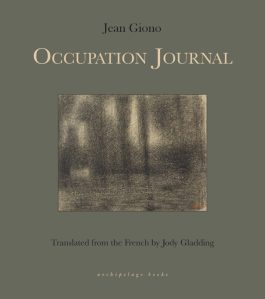Jean Giono’s Occupation Journal, covering the year between September 1943 and September 1944, (published in French in 1995 and only now translated into English by Jody Gladding) becomes a far more recognisable text under our own current lockdown conditions. “More and more I am immersed in a very great solitude,” Giono tells us, though he also declares, “I have never been so happy as now.”
“I believe I am deeply grateful for everything that forcefully cuts me off from the world.”
In 1943 Giono was forty-eight years old, living, as he did for most of his life, in Manosque in Provence and famous for his portrayal of Provencal peasant life in novels such as Hill and Second Harvest. His writing would begin to change with the publication of Melville in 1941, a novel he continued to have affection for (“I don’t consider anything I’ve done to be valuable,” he says, “Possibly Colline (Hill) and Pour saluer Melville, but just barely if at all”). His pacifism had already brought him into conflict with the state with a brief arrest in 1939, and shortly after the final journal entry he was arrested again, accused of being a Nazi sympathiser, and imprisoned for five months without charge. (Giono’s pacifism originated from his experience in the First World War: at Verdun he was one of eleven survivors in his company. He wrote about his experience in To the Slaughterhouse).
Despite the title, a direct translation, Giono states:
“This is not a journal. It’s simply a tool of the trade. My life is not completely depicted. Nor would I want it to be. As I’ve said here, I practice scales, I break up my sentences, I try to stick as closely as possible to the truth.”
This does not, however, mean that its publication is undeserved. In fact, although by its nature the insights it contains are scattered, it covers a lot of ground. Not only do we get a sense of conditions in France during the year before liberation, but we also have a window into the daily life of a writer, as well as Giono’s musings on art and politics. Less vital, but still interesting, we see the practical problems he faces: illness is common place, and two members of his family, an aunt and uncle who both stay with him, die in the course of the year. Money is another frequently mentioned challenge. “I can’t wait to be less strapped for money,” he tells us, and:
“I work precisely to make a living.”
In June he tells us, “I now have the same money worries as in January,” and, in the course of the year he resorts to selling two of his manuscripts:
“I’m mad at myself for all my generosities that now force me to part with these manuscripts.”
It doesn’t hep that he is widely regarded as rich – “the legend of my ‘immense’ fortune” as he describes it. (I couldn’t help but feel that many writers would sympathise with these problems!).
The journal also contains some thoughts on what he is reading. Of Nicholas Nickleby he says:
“…the story doesn’t escape ‘Punch’: caricature, sentimentality. It’s very engaging, despite some long passages that seem to drag on, but it remains a sketch, witty, exceptionally well constructed, but constructed.”
He is much more complementary when it comes to Stendhal and Balzac, and saves his most scathing remarks for Gone with the Wind:
“The women are cardboard cutouts. How do they have children?… Does Scarlett even have sex organs?”
Throughout, the war forms a background to Giono’s work and thoughts:
“This morning gunfire can be heard very distinctly from the south.”
As the possibility of the Allies freeing France from German occupation increases, different groups compete for power and influence. “The country is all abuzz with conspiracies,” Giono tells us, and “…it’s going to devolve into murder, pure and simple.” This is indeed what happens in May:
“The attack in Voiron a sign of the times. A whole family shot dead from the eighty-year-old grandmother to a child, three years old, killed in its crib by three bullets to the neck and one in the belly. The murderers (what other word to use?) are students and teachers at the vocational school in the town!”
As a pacifist, Giono deplores all violence, but he also feels “War and revolution never killed the right people” and doesn’t trust the Communists not to collaborate with the bourgeoisie they find useful to them. (He also sees them as anti-peasant). When France is finally liberated he is not:
“I’m not leaving the house and not going into town.”
Even before his arrest he is preparing his defence:
“I tell him I wish everyone had done as much as I did for the poor wretches hunted down by the Gestapo.”
Above all, Occupation Journal demonstrates that, in war, it is not good against evil, but, in fact, life becomes even more morally murky than before.
Occupation Journal is not just for Giono completists – it’s a fascinating historical document as well as an interesting insight into the life of a writer. It would probably have benefitted from an introduction and notes, both to provide the historical background, and to clarify the many references Giono makes to his work, particularly what he is writing at the time, but that does not prevent it from being eminently readable, particularly at today:
“The mental vicissitudes that all the contradictory passions of the present moment make us go through destroy any equilibrium.”



